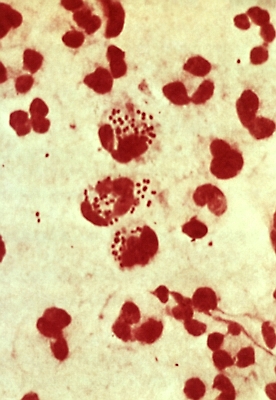Medorrhinum
Medorrhinum
Origin
Discharge from the gonorrhea bacterium, Neisseria gonorrhoeae, which commonly infects the mucous membranes of the vagina or urethra.
Background
Worldwide, one of the most common sexually transmitted diseases, now treated with antibiotics; earlier forms of treatment included silver nitrate injections.
Preparation
Urethral discharge from a male patient infected with gonorrhea is diluted in purified water and succussed to make the homeopathic remedy.
Common Names
Gonorrhea.
Discharge from the gonorrhea bacterium, Neisseria gonorrhoeae, which commonly infects the mucous membranes of the vagina or urethra.
Background
Worldwide, one of the most common sexually transmitted diseases, now treated with antibiotics; earlier forms of treatment included silver nitrate injections.
Preparation
Urethral discharge from a male patient infected with gonorrhea is diluted in purified water and succussed to make the homeopathic remedy.
Common Names
Gonorrhea.

GONORRHEA
Transmitted via sexual contact,
this infection invades the reproductive system
and can cause sterility if left untreated.
Key Symptoms
behavioral extremes; hurried feeling; extremely passionate nature; person feels better for lying on the abdomen and in the evening-
Galen, the famous Greek physician active in the 2nd century CE, gave gonorrhea its name, from gonos, or "seed," and rhoia, or "flow." It is thought that the disease predates ancient Greece, however, and was known in ancient Egypt and China. Widespread by the 18th century, gonorrhea was considered a major underlying cause of illness, described by Hahnemann as a "miasm". The remedy, derived from a "nosode" of the infection itself, was proved by
Dr. Swan and published in Allen's Materia Medica of Nosodes (1880–90).
Remedy Profile
Medorrhinum is best suited to people who feel hurried and anxious, yet simultaneously isolated and empty, in a dreamlike, detached state. They are passionate and experience life to the limit. Behavioral extremes are not uncommon, ranging from a withdrawn, aesthetically sensitive state to an egotistical, selfish one.Physical symptoms typically center on mucous membranes, which are prone to infection. Symptoms are generally better for a discharge of mucus, for sea air, and in the evening. In damp weather, and between 3 a.m. and 4 a.m., they tend to worsen. A thirst for cold drinks and cravings for meat, fish, salt, sweets, and unripe foods are common, as is an aversion to "slimy" foods such as eggplant or oysters.
Medorrhinum is prescribed for infections of the urinary tract, reproductive system, genitals, and respiratory tract. It is also a remedy for asthma, and may be especially effective for those who have a personal or family history of gonorrhea or early heart disease.
Urinary-tract infections
Symptoms: Sharp, burning pain on urinating, perhaps with a yellow, pus-filled discharge or blood in the urine (indicative of nonspecific urethritis), or with a frequent urge to urinate, if cystitis is the cause. In severe cases, kidney infections such as renal colic may follow. In men, if accompanied by pain in the abdomen, lower back, rectum, or testicles, fever, and a urinal discharge, symptoms may be due to prostatitis.Symptoms better: For kneeling on all fours; for lying on the abdomen; in the evening.
Symptoms worse: For hot weather; for passing urine; for movement.
Women's health
Symptoms: Profuse, foul-smelling menstrual flow, and an acrid, thick vaginal discharge with a fishy odor. There may be marked sensitivity near the cervix, tenderness in the breasts and nipples, and even sterility.Symptoms better: For kneeling on all fours; for lying on the abdomen; in the evening.
Symptoms worse: For hot weather; for passing urine; for movement.
Testicular pain
Symptoms: Prostatitis with an enlarged, painful, heavy prostate gland. The urethra may be inflamed and tender with a foul-smelling discharge, and there may be impotency.Symptoms better: For kneeling on all fours; for lying on the abdomen; in the evening.
Symptoms worse: For hot weather; for passing urine; for movement.
Genital warts & herpes
Symptoms: Cauliflower-like, pink warts on the genitals. A sore, itchy rash of small genital blisters bursting to leave painful ulcers is indicative of herpes.Symptoms better: For kneeling on all fours; for lying on the abdomen; in the evening.
Symptoms worse: For hot weather; for passing urine; for movement.
Rhinitis, sinusitis & asthma
Symptoms: Burning, profuse catarrh, which is associated with inflammation of the mucous 200membranes in the nose. There may be rhinitis, with postnasal drip (mucus that drips down the back of the throat) and frequent sneezing. Pressure and aching in the sinuses may develop into sinusitis. Asthma may occur, and is typically better for lying on the abdomen and sticking out the tongue. There may be a cough that is also better for lying on the abdomen, and aggravated by sweet foods and drinks. A further symptom is sore, watering eyes that may develop conjunctivitis.Symptoms better: For sea air; for lying on the abdomen and sticking out the tongue.
Symptoms worse: For cold; for damp; during the day.
© 2024 KnowHomeopathy | All rights reserved